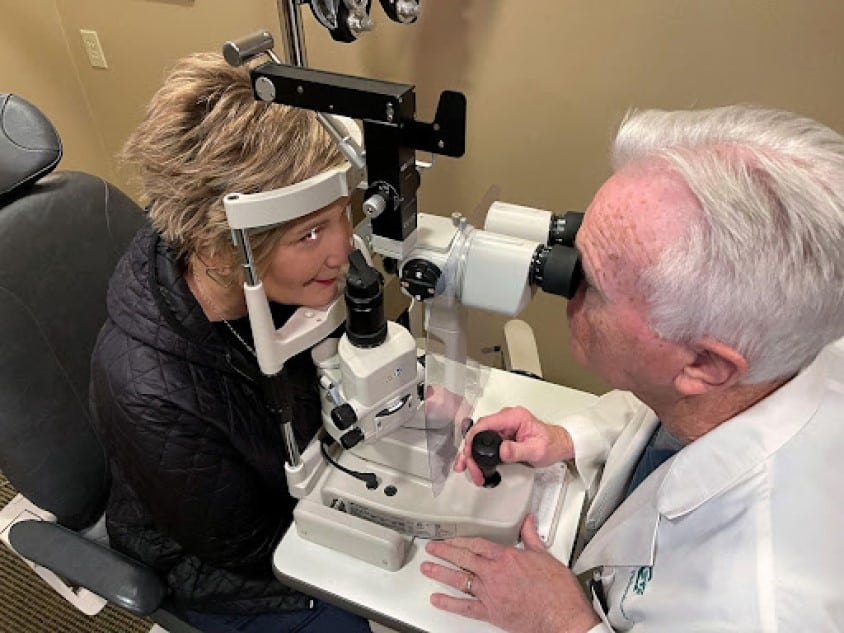Just like your car, your body needs energy to operate. It gets that energy from the food you eat, breaking it down into a power-packed sugar called glucose. This simple carbohydrate travels via the bloodstream to energize every cell in the body.
But the body must also regulate this potent fuel or face serious health consequences. That’s the job of insulin, a hormone produced in the pancreas: When glucose in the bloodstream rises above normal levels, the pancreas releases just enough insulin to bring it back within normal range.
When the body can’t produce insulin—or enough of it—serious health problems can arise. This condition, diabetes mellitus, can potentially trigger a myriad of health issues, from nerve damage to kidney dysfunction.
It could also rob you of your eyesight.
“I would estimate around a third of our patients struggle with diabetes,” says Dr. David Richardson, ophthalmologist with Hattiesburg Eye Clinic. “For many of them, the disease significantly impacts their eye health.”
Hattiesburg Eye Clinic and other eye care providers across the country recognize November as Diabetic Eye Disease Awareness Month. Dr. Richardson and his colleagues want everyone to know how this major chronic health condition can affect your eyesight, and what you can do about it.
According to Dr. Richardson, the most prevalent eye malady among diabetics is cataracts. Although this clouding of the eye lens happens to most of us as we get older, the condition is of more heightened concern for diabetics.
“Diabetics tend to have different forms of cataracts than the general public,” says Dr. Richardson. “But of even greater concern is that cataracts can develop earlier and more rapidly with diabetics than for those who don’t have the disease.”
And, cataracts aren’t the only eye issue diabetics can face. They’re also prone to another condition known as diabetic retinopathy.
“This is actually a type of blood vessel disease caused by diabetes,” says Dr. Richardson. “The effects of diabetes can damage certain cells called pericytes within a blood vessel, which serve as a kind of glue to hold the vessel together as it expands and contracts. This can lead to blood leakage, in this case within the eyes.”
As the vessels attempt to repair themselves, they also create scar tissue. Both the leakage and scar tissue can affect the ability of the retina at the back of the eye to detect and transmit images. Without treatment, the effect on the retina can grow worse and lead to blindness.
These and other eye conditions aggravated by diabetes pose serious threats to a patient’s vision. So, if you have diabetes (or you’re at high risk for developing it), what can you do to protect your eyesight?
“First and foremost, it’s important that you effectively manage diabetes if you have it,” says Dr. Richardson. “This includes cultivating a healthy lifestyle of diet and exercise, and getting rid of unhealthy habits like smoking. It also includes taking steps under a doctor’s care to control blood glucose levels as measured by A1C testing.”
Dr. Richardson says it’s also important for diabetics to undergo a comprehensive eye examination each year. Although eye care providers typically recommend annual exams for patients over 40, diabetics should start annual exams as soon as they’re diagnosed.
“Because of the early and rapid development of diabetic eye diseases, it’s important to detect their presence as soon as possible. We have a number of reliable treatments for these diseases, but they’re much more effective If we can detect any problems in their early stages.”
Today’s medical treatments and technology allow most people with diabetes to live long and productive lives. And with effective disease management and vigilant vision monitoring, they can also protect their eyesight for years to come.
To learn more about diabetic eye diseases and how to treat or prevent them, visit our website. To find out how Hattiesburg Eye Clinic can improve your vision health, call 601-268-5910 (or toll-free 800-624-8254) or schedule a consultation with us at www.hattiesburgeyeclinic.com/contact-us/


